Abstract
The role of L3T4+ (CD4+) T lymphocytes in the resistance of mice of different haplotypes to Toxoplasma gondii was examined, using the monoclonal antibody GK 1.5. Outbred Swiss-Webster or inbred CBA/Ca (H-2k), BALB/c (H-2d), and C57BL/6 (H-2b) mice injected with monoclonal antibody GK 1.5 24 h before and 24 h and 7, 15, and 21 days after oral inoculation with 10 live cysts of the low-virulence strain ME49 of T. gondii exhibited an almost complete abrogation of their antibody and cell-mediated immune responses to the parasite. Delayed-type hypersensitivity response and lymphocyte stimulation assays showed significantly reduced values compared with those of control mice inoculated with ME49 cysts but not treated with the monoclonal antibody. The number of T. gondii cysts in the brains of GK 1.5-treated mice was significantly higher than in controls. Challenge of the GK 1.5-treated and chronically infected mice with the virulent RH strain of T. gondii resulted in 100% mortality, whereas 100% of chronically infected controls survived the infection. These results suggest that L3T4+ (CD4+) T lymphocytes actively participate in the development of resistance to T. gondii and in the mechanisms controlling the formation of cysts of the parasite in the brains of mice.
Full text
PDF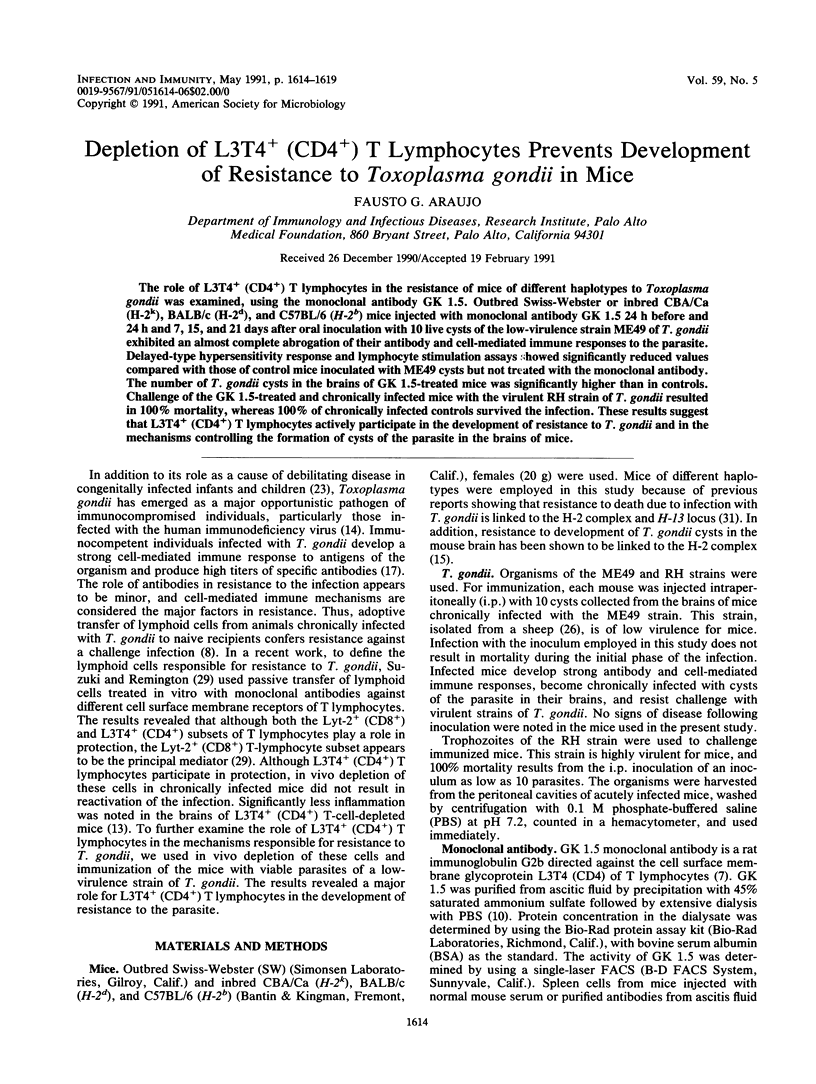
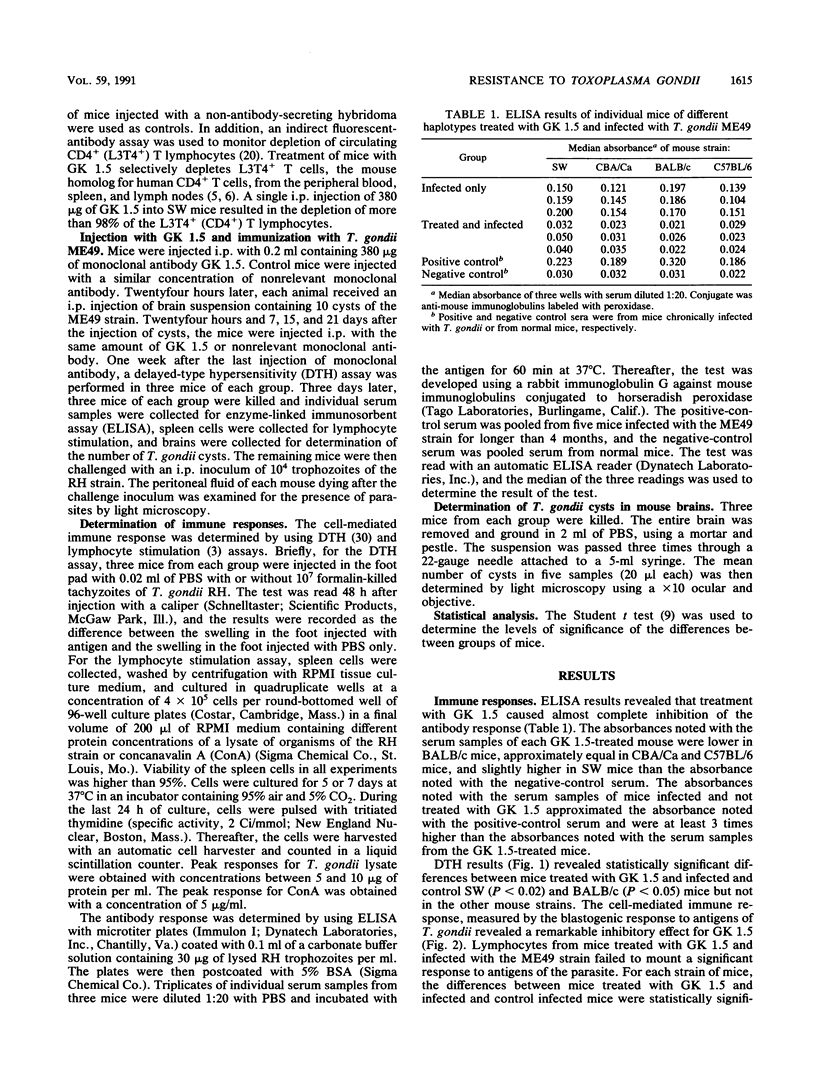
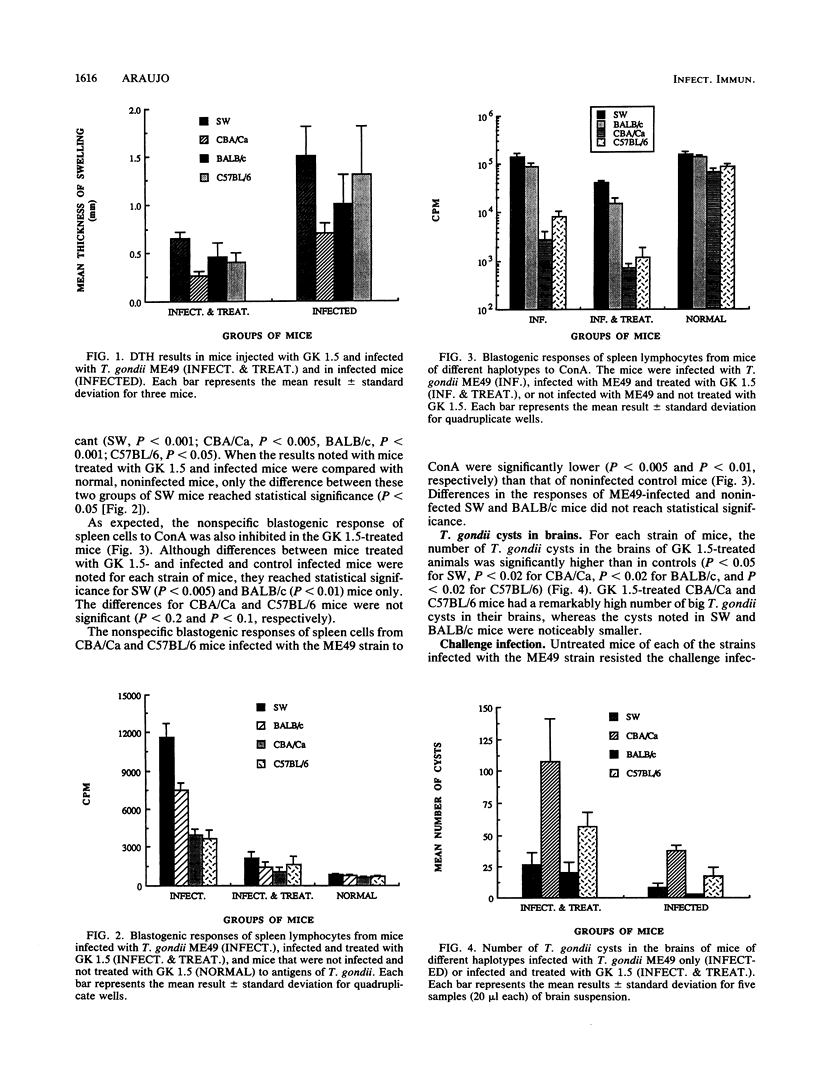
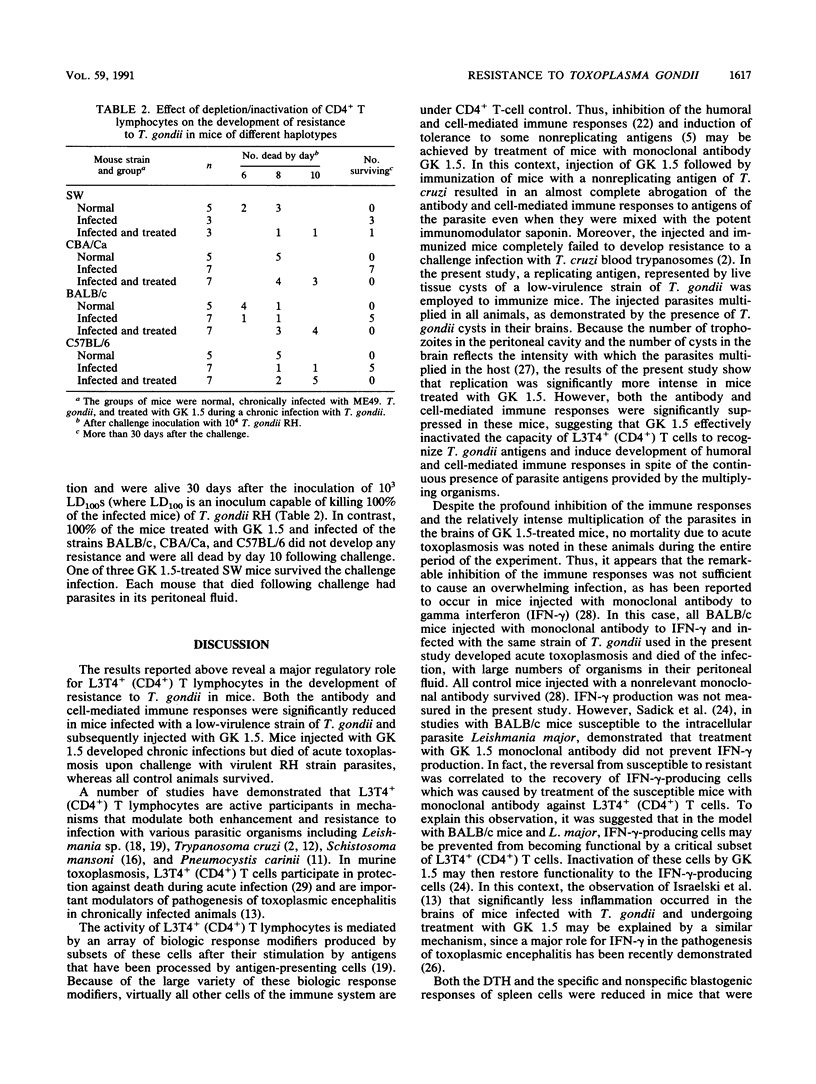
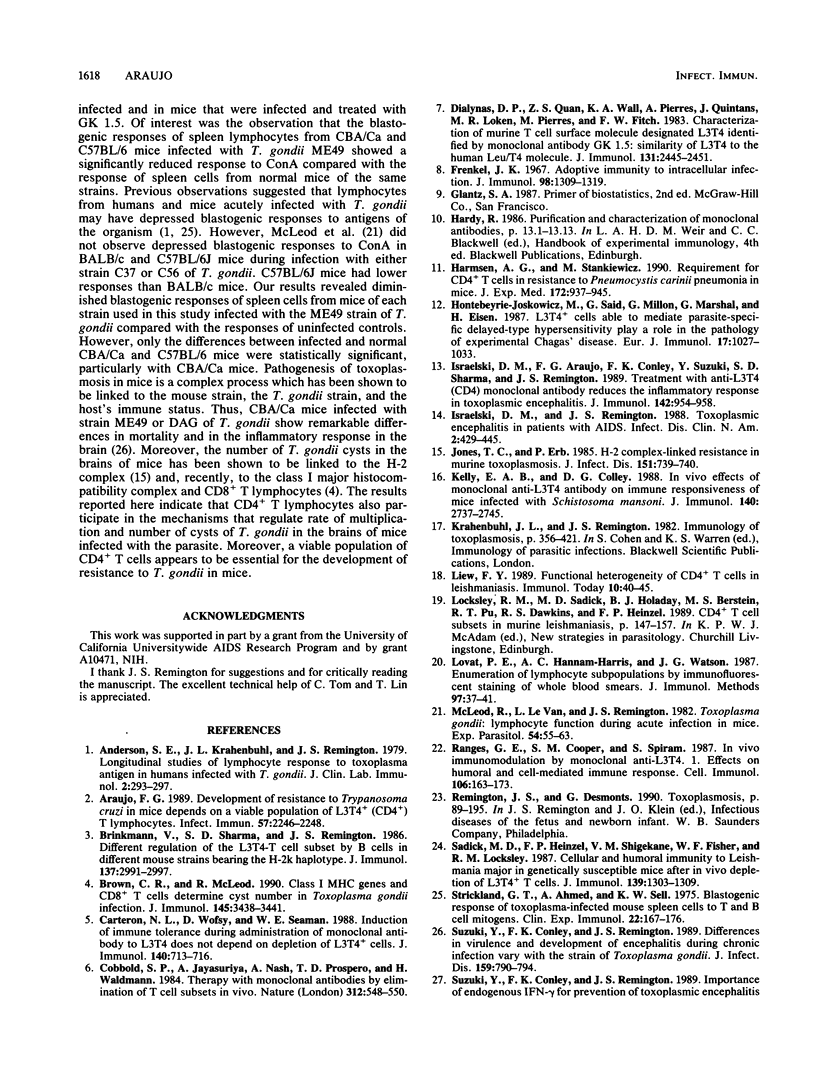
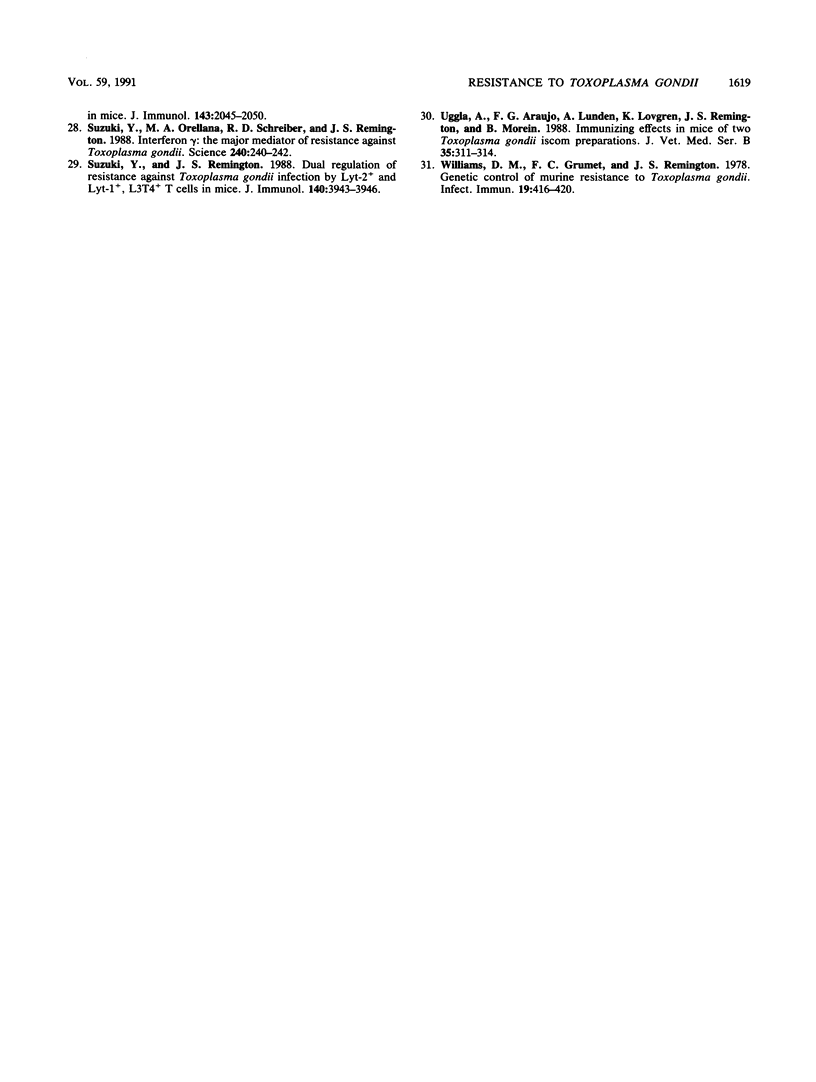
Selected References
These references are in PubMed. This may not be the complete list of references from this article.
- Anderson S. E., Jr, Krahenbuhl J. L., Remington J. S. Longitudinal studies of lymphocyte response to Toxoplasma antigen in humans infected with T. gondii. J Clin Lab Immunol. 1979 Nov;2(4):293–297. [PubMed] [Google Scholar]
- Araujo F. G. Development of resistance to Trypanosoma cruzi in mice depends on a viable population of L3T4+ (CD4+) T lymphocytes. Infect Immun. 1989 Jul;57(7):2246–2248. doi: 10.1128/iai.57.7.2246-2248.1989. [DOI] [PMC free article] [PubMed] [Google Scholar]
- Brinkmann V., Sharma S. D., Remington J. S. Different regulation of the L3T4-T cell subset by B cells in different mouse strains bearing the H-2k haplotype. J Immunol. 1986 Nov 1;137(9):2991–2997. [PubMed] [Google Scholar]
- Brown C. R., McLeod R. Class I MHC genes and CD8+ T cells determine cyst number in Toxoplasma gondii infection. J Immunol. 1990 Nov 15;145(10):3438–3441. [PubMed] [Google Scholar]
- Carteron N. L., Wofsy D., Seaman W. E. Induction of immune tolerance during administration of monoclonal antibody to L3T4 does not depend on depletion of L3T4+ cells. J Immunol. 1988 Feb 1;140(3):713–716. [PubMed] [Google Scholar]
- Cobbold S. P., Jayasuriya A., Nash A., Prospero T. D., Waldmann H. Therapy with monoclonal antibodies by elimination of T-cell subsets in vivo. Nature. 1984 Dec 6;312(5994):548–551. doi: 10.1038/312548a0. [DOI] [PubMed] [Google Scholar]
- Dialynas D. P., Quan Z. S., Wall K. A., Pierres A., Quintáns J., Loken M. R., Pierres M., Fitch F. W. Characterization of the murine T cell surface molecule, designated L3T4, identified by monoclonal antibody GK1.5: similarity of L3T4 to the human Leu-3/T4 molecule. J Immunol. 1983 Nov;131(5):2445–2451. [PubMed] [Google Scholar]
- Frenkel J. K. Adoptive immunity to intracellular infection. J Immunol. 1967 Jun;98(6):1309–1319. [PubMed] [Google Scholar]
- Harmsen A. G., Stankiewicz M. Requirement for CD4+ cells in resistance to Pneumocystis carinii pneumonia in mice. J Exp Med. 1990 Sep 1;172(3):937–945. doi: 10.1084/jem.172.3.937. [DOI] [PMC free article] [PubMed] [Google Scholar]
- Hontebeyrie-Joskowicz M., Said G., Milon G., Marchal G., Eisen H. L3T4+ T cells able to mediate parasite-specific delayed-type hypersensitivity play a role in the pathology of experimental Chagas' disease. Eur J Immunol. 1987 Jul;17(7):1027–1033. doi: 10.1002/eji.1830170720. [DOI] [PubMed] [Google Scholar]
- Israelski D. M., Araujo F. G., Conley F. K., Suzuki Y., Sharma S., Remington J. S. Treatment with anti-L3T4 (CD4) monoclonal antibody reduces the inflammatory response in toxoplasmic encephalitis. J Immunol. 1989 Feb 1;142(3):954–958. [PubMed] [Google Scholar]
- Israelski D. M., Remington J. S. Toxoplasmic encephalitis in patients with AIDS. Infect Dis Clin North Am. 1988 Jun;2(2):429–445. [PubMed] [Google Scholar]
- Jones T. C., Erb P. H-2 complex-linked resistance in murine toxoplasmosis. J Infect Dis. 1985 Apr;151(4):739–740. doi: 10.1093/infdis/151.4.739. [DOI] [PubMed] [Google Scholar]
- Kelly E. A., Colley D. G. In vivo effects of monoclonal anti-L3T4 antibody on immune responsiveness of mice infected with Schistosoma mansoni. Reduction of irradiated cercariae-induced resistance. J Immunol. 1988 Apr 15;140(8):2737–2745. [PubMed] [Google Scholar]
- Liew F. Y. Functional heterogeneity of CD4+ T cells in leishmaniasis. Immunol Today. 1989 Feb;10(2):40–45. doi: 10.1016/0167-5699(89)90302-2. [DOI] [PubMed] [Google Scholar]
- Lovat P. E., Hannam-Harris A. C., Watson J. G. Enumeration of lymphocyte subpopulations by immunofluorescent staining of whole blood smears. J Immunol Methods. 1987 Feb 26;97(1):37–40. doi: 10.1016/0022-1759(87)90102-5. [DOI] [PubMed] [Google Scholar]
- McLeod R., Van Le L., Remington J. S. Toxoplasma gondii: lymphocyte function during acute infection in mice. Exp Parasitol. 1982 Aug;54(1):55–63. doi: 10.1016/0014-4894(82)90110-2. [DOI] [PubMed] [Google Scholar]
- Ranges G. E., Cooper S. M., Sriram S. In vivo immunomodulation by monoclonal anti-L3T4. 1. Effects on humoral and cell-mediated immune response. Cell Immunol. 1987 Apr 15;106(1):163–173. doi: 10.1016/0008-8749(87)90159-6. [DOI] [PubMed] [Google Scholar]
- Sadick M. D., Heinzel F. P., Shigekane V. M., Fisher W. L., Locksley R. M. Cellular and humoral immunity to Leishmania major in genetically susceptible mice after in vivo depletion of L3T4+ T cells. J Immunol. 1987 Aug 15;139(4):1303–1309. [PubMed] [Google Scholar]
- Strickland G. T., Ahmed A., Sell K. W. Blastogenic response of Toxoplasma-infected mouse spleen cells to T- and B-cell mitogens. Clin Exp Immunol. 1975 Oct;22(1):167–176. [PMC free article] [PubMed] [Google Scholar]
- Suzuki Y., Conley F. K., Remington J. S. Differences in virulence and development of encephalitis during chronic infection vary with the strain of Toxoplasma gondii. J Infect Dis. 1989 Apr;159(4):790–794. doi: 10.1093/infdis/159.4.790. [DOI] [PubMed] [Google Scholar]
- Suzuki Y., Conley F. K., Remington J. S. Importance of endogenous IFN-gamma for prevention of toxoplasmic encephalitis in mice. J Immunol. 1989 Sep 15;143(6):2045–2050. [PubMed] [Google Scholar]
- Suzuki Y., Remington J. S. Dual regulation of resistance against Toxoplasma gondii infection by Lyt-2+ and Lyt-1+, L3T4+ T cells in mice. J Immunol. 1988 Jun 1;140(11):3943–3946. [PubMed] [Google Scholar]
- Uggla A., Araujo F. G., Lunden A., Lövgren K., Remington J. S., Morein B. Immunizing effects in mice of two Toxoplasma gondii iscom preparations. Zentralbl Veterinarmed B. 1988 May;35(4):311–314. doi: 10.1111/j.1439-0450.1988.tb00501.x. [DOI] [PubMed] [Google Scholar]
- Williams D. M., Grumet F. C., Remington J. S. Genetic control of murine resistance to Toxoplasma gondii. Infect Immun. 1978 Feb;19(2):416–420. doi: 10.1128/iai.19.2.416-420.1978. [DOI] [PMC free article] [PubMed] [Google Scholar]


